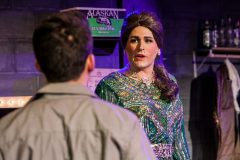by Patricia Lesko
Theatre Nova’s founding artistic director Carla Milarch is no stranger to transformations. The one-time executive director of the Performance Network, Milarch left that venue in 2014 amid problems with the non-profit’s income taxes, finances and mounting debt. Now, three years later, Milarch is at Theatre Nova aiming to recreate the theatrical successes that marked her tenure at the now- closed Performance Network, and trying to coax Ann Arbor residents to support local theatre. With Theatre Nova’s production of “The Legend of Georgia McBride” by playwright Matthew Lopez, Milarch hits a bullseye. The small cast (one actor plays both a drag queen and a surprisingly broad-minded, small-town landlord) come together to provide an evening of what can only be described as Absolutely Fabulous entertainment, Sweetie. The play is funny, fun, touching and dabbles in identity politics.
The Saturday evening performance I attended wasn’t sold out. The audience, all white, was comprised primarily of Baby Boomers. They didn’t always get the jokes or the camp. It took the audience a bit of time to loosen up, enjoy the shows, get into the drag numbers and make good use of the play money given out before the play begins.
The one-act play features actors Nick Yocum, Vince Kelley, Richard Payton, Meredith Deighton, and Joe Bailey. It is directed by Brandy Joe Plambeck. The design team includes Stephen Carpenter (scenic design), Vince Kelley (costume design), Michael Ameloot (auxiliary costumes), Brandy Joe Plambeck (sound design), Dan Walker (lighting design) and Alisa Marie Chirco (makeup).
There is no intermission during the almost two hour performance that centers around the musical ambitions and transformations of “Casey” (Yokum). He’s a young Elvis impersonator with a newly pregnant wife, unpaid rent, a maxed out credit card and an act that’s about to be replaced with a drag show by “Eddie,” (Bailey) the owner of Cleo’s, the small-town Florida panhandle bar where Casey performs. In desperate need of money, with the help of drag diva “Miss Tracy Mills” (Kelley) Casey is successfully (and hilariously) transformed into drag performer Georgia McBride and, together with the audience, tutored in the ways of the drag diva.
It’s clear that Casey/Georgia McBride is straight, and struggles through a transformation as he practices, learns and then embraces the art that is performing in drag. The piles of money generated by the drag show keep Casey’s rent paid. It also keeps him pencilling his eyebrows and tweaking his mascara, but hiding his new job from his wife causes problems. His wife “Jo” (Deighton) is the least engaging character, but Meredith Deighton does a good job of bringing to life a small-town, southern woman who has a predictable and limited emotional range. Likewise, Richard Payton’s Rexy has one volume—loud. His cleverly sly performance as Casey’s hen-pecked, high school friend is much stronger. The best-written characters, and the most compelling performances, come from Yocum and Kelley. Their crackling chemistry binds the cast together, keeps Cleo’s customers coming back for more and carries the play.
Yocum’s transition to Georgia McBride is directed with elan, éclat and camp by Miss Tracy Mills, who finds herself forced to bring Casey into the universe of drag queens when alcoholic Rexy (Payton), a demanding diva, falls down drunk on the job. Miss Tracy instructs Casey during a crash course in lip-synching Edith Piaf’s “Padam Padam.”
“The key to lip-synching is repeating the words ‘watermelon motherf***er,'” explains Miss Tracy in her best Blanche Dubois drawl.
Her pupil listens intently as he struggles into pantyhose, slides into a slinky dress and tops it all off with a wig. Casey wobbles in his stiletto heels on stage at Cleo’s and in a scene of hilarity, “sings” while the voice of Edith Piaf fills the theater. Later in the show, a fun montage documents Casey’s burgeoning talents as a drag performer.
The show is not all fabulous drag shows and pop music, however. Both Miss Tracy and Rexy instruct a less-than-enlightened Casey on growing up gay in small-town America. There’s rejection, there are beatings, there’s the knowledge that being different is little more than a dangerous, Herculean struggle. If I have one criticism of the show, it is with the acting and direction of the monologues of the characters (Rexy and Miss Tracy) who share these shocking and poignant memories with Casey (and the audience). The stories, the words, are delivered, but the exchanges don’t create moments that resonate. The playwright’s words become teachable moments for the audience instead of profound and heartfelt exchanges of sentiment between two gay men and their straight protégé.
Scenic designer Steven Carpenter makes excellent use of every inch of Theatre Nova’s small stage. He combines Casey/Jo’s apartment, the backstage of Cleo’s, and the front of the curtain at Cleo’s into a revolving and split stage.
Vince Kelley (costume design) and Michael Ameloot (auxiliary costumes) do a splendid job with the numerous costumes. Yokum and Kelley do an equally splendid job with the often quick costume changes. There are, for example, a dozen costumes for the drag queen performances: Cher, Dolly Parton, Edith Piaf and other homages are perfectly designed and costumed.
You don’t have to be gay or a drag fan to love this play. You just have to buy a ticket. You’ll meet unforgettable drag queens and enjoy several spectacular shows at Cleo’s. Don’t forget to be generous when you tip Miss Tracy and Georgia McBride. A girl, after all, needs to pay the rent and support her family.

